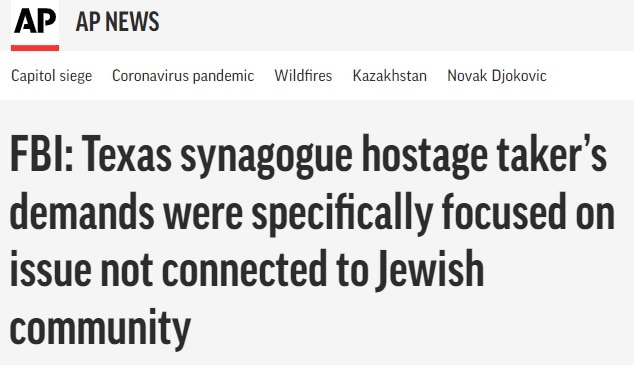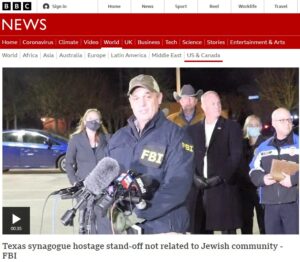Texas Synagogue Attack Was Motivated by Antisemitism — But Not for the New York Times and BBC
 by Gidon Ben-Zvi
by Gidon Ben-Zvi

A person walks across a street lined with terraced housing in Blackburn, Britain, January 17, 2022. REUTERS/Phil Noble
Is it anti-Jewish to take hostages at a synagogue, with the goal of getting a notoriously antisemitic terrorist released from prison? For The New York Times and the British Broadcasting Corporation (BBC), the answer is unclear.
Despite recent developments, the two outlets have not accurately detailed the nature of Saturday’s attack at Congregation Beth Israel in Colleyville, Texas. As a result, millions of people around the world may doubt that holding Jews captive in a Jewish house of prayer is “not specifically related to the Jewish community.”
Many news organizations cited in their coverage a statement by Matthew Desarno, special agent in charge of FBI Dallas, who, at an earlier news conference, suggested that the hostage-taker was “specifically focused on one issue.”
Desarno was referring to Malik Faisal Akram’s demand that Aafia Siddiqui, a Pakistani national sentenced to 86 years in prison for the attempted murder of American personnel in Afghanistan, be immediately released. Siddiqui, dubbed “Lady Al Qaeda,” wrote that Jews “have always back-stabbed everyone who has taken pity on them and made the ‘fatal’ error of giving them shelter.”
During her trial, she told the presiding judge that she did not want any Jewish people in the jury, “if they have a Zionist or Israeli background,” adding that “everyone here is [Israeli], subject to genetic testing.” Shortly after her conviction, Siddiqui declared: “This is a verdict coming from Israel and not from America. That’s where the anger belongs.”
The perpetrator of Saturday’s attack, Malik Akram, forced the Texas synagogue’s rabbi to call Manhattan’s Central Synagogue, a law enforcement source told The New York Post. Akram demanded to speak to leading Reform Rabbi Angela Buchdahl, so she could use her “influence” to help get Siddiqui freed. According to President Joe Biden, Akram furthermore made “antisemitic and anti-Israeli comments” throughout the standoff.


News sites ran with Desarno’s early comments, prompting similar headlines in the Associated Press, the BBC, and other publications.
Desarno’s remarks ignited a social media firestorm:
Hey @AP… fix your headlines. Are you kidding me? In big bold writing, you declare “FBI: Hostage taker was not focused on Jewish community” Why do you *think* he chose a SYNAGOGUE as his target exactly???https://t.co/PC0nRLlOdE
— ?S.L. Frostishook ☃️ (@Stpolishook) January 16, 2022
In a statement released on Sunday, the FBI walked back Desarno’s claim.
“This is a terrorism-related matter, in which the Jewish community was targeted, and is being investigated by the Joint Terrorism Task Force,” the bureau said, adding that “preventing acts of terrorism and violence is the number one priority of the FBI.”
In response, many news outlets that had included the earlier “not connected to Jewish community” assertion updated their reporting (for example, see NBC, ABC, and the AP’s coverage).
Two notable exceptions to this example of journalistic due diligence have been The New York Times and the BBC.
In 2021, the Times ignored the Anti-Defamation League’s (ADL) annual summary that found antisemitic incidents had remained at historic high levels across the United States in the previous year. This lack of interest from one of the world’s most widely read news organizations is especially curious because the ADL’s Annual Audit of Antisemitic Incidents was reported on by local news media.
And with regards to the BBC, this is the latest in a series of events that together raise serious questions about the BBC’s impartiality regarding Israel and the Jewish people. Last year, HonestReporting helped expose the antisemitic tweets of reporter Tala Halawa. After an HonestReporting tweet went viral, the issue received widespread media coverage, and the BBC eventually fired Halawa a few weeks later. Another HonestReporting investigation thereafter uncovered numerous antisemitic social posts by a different BBC employee, Nasima Begum. And the BBC recently defamed Jewish victims of an antisemitic attack in London.
The Times and the BBC must make clear that the evidence underpinning the FBI’s investigation into a hostage incident that garnered global attention shows that it was indeed an antisemitic attack.
The author is a contributor to HonestReporting, a Jerusalem-based media watchdog with a focus on antisemitism and anti-Israel bias — where a version of this article first appeared. Akiva Van Koningsveld contributed to this report
 Police Stop Anti-Zionist Agitators From Accessing Florida University President’s Home as Students Revolt Nationwide
Police Stop Anti-Zionist Agitators From Accessing Florida University President’s Home as Students Revolt Nationwide Nearly One in Five Young People Sympathize With Hamas, 29% Say US Should Reduce or End Alliance With Israel: Poll
Nearly One in Five Young People Sympathize With Hamas, 29% Say US Should Reduce or End Alliance With Israel: Poll Ilhan Omar Silent After Daughter’s Arrest, Suspension for Role in Columbia University Anti-Israel Protest
Ilhan Omar Silent After Daughter’s Arrest, Suspension for Role in Columbia University Anti-Israel Protest Cultural Center Backed by Iran’s Revolutionary Guard Plans to Produce Films About Attack on Israel
Cultural Center Backed by Iran’s Revolutionary Guard Plans to Produce Films About Attack on Israel How Does Ilhan Omar Really Feel About Iran?
How Does Ilhan Omar Really Feel About Iran? This Passover, Combine Respect for Tradition with the Courage to Innovate
This Passover, Combine Respect for Tradition with the Courage to Innovate Israel’s Iran Attack Carefully Calibrated After Internal Splits, US Pressure
Israel’s Iran Attack Carefully Calibrated After Internal Splits, US Pressure Palestinian Cameramen Exposed in New Footage Documenting Oct. 7 Atrocities Side by Side with Terrorists
Palestinian Cameramen Exposed in New Footage Documenting Oct. 7 Atrocities Side by Side with Terrorists US Money to Convicted Terrorists; US Training to Aspiring Terrorists
US Money to Convicted Terrorists; US Training to Aspiring Terrorists Man Arrested in Paris After Iran Consulate Incident
Man Arrested in Paris After Iran Consulate Incident



 US Money to Convicted Terrorists; US Training to Aspiring Terrorists
US Money to Convicted Terrorists; US Training to Aspiring Terrorists Palestinian Cameramen Exposed in New Footage Documenting Oct. 7 Atrocities Side by Side with Terrorists
Palestinian Cameramen Exposed in New Footage Documenting Oct. 7 Atrocities Side by Side with Terrorists Israel’s Iran Attack Carefully Calibrated After Internal Splits, US Pressure
Israel’s Iran Attack Carefully Calibrated After Internal Splits, US Pressure This Passover, Combine Respect for Tradition with the Courage to Innovate
This Passover, Combine Respect for Tradition with the Courage to Innovate How Does Ilhan Omar Really Feel About Iran?
How Does Ilhan Omar Really Feel About Iran?